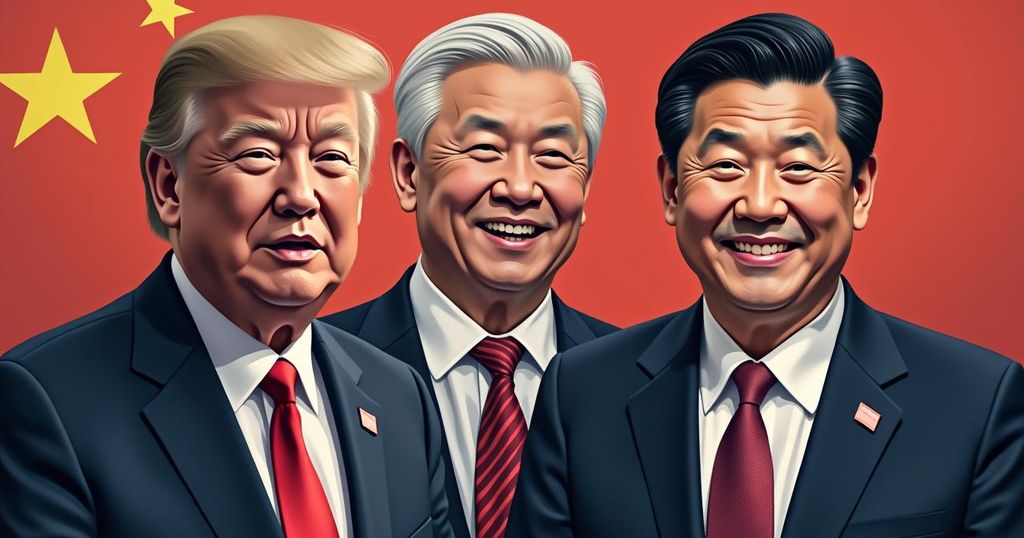Chinese citizens are closely monitoring the upcoming U.S. election due to concerns about its implications for Sino-American relations. Both Donald Trump and Kamala Harris evoke mixed feelings among the populace, with fears of conflict, economic repercussions from tariffs, and hopes for cultural exchanges prevalent in discussions. As tensions remain high concerning Taiwan and international conflicts, the election outcome is viewed as crucial for both peace and stability in the region.
In China, there is significant interest and concern surrounding the upcoming U.S. presidential election, as many citizens are acutely aware of the potential implications for Sino-American relations. “None of us wants to see a war,” expresses Mr. Xiang, a local dance enthusiast, amidst the lively atmosphere at Ritan Park. He acknowledges the precarious state of international relations, particularly regarding Taiwan and ongoing global conflicts, fostering anxiety about the election’s outcome. A group of individuals gathered in the park, notably cautious about expressing their views, discussed their apprehensions regarding war not only between the United States and China but also the escalation of other conflicts worldwide. Mr. Meng, who supports Donald Trump, believes that despite Trump’s economic sanctions against China, he is less likely to instigate a military confrontation compared to President Biden, whom he views as having engaged in more conflict through his policies, particularly in Ukraine. Additionally, younger participants reflected on Harris, noting uncertainty about her policies, leading them to associate her with Biden’s potentially aggressive stance. The discussion also highlights a prevalent narrative within Chinese state media, which tends to portray the U.S. as blameworthy in its global interventions. Some Chinese believe Harris may provide more stability concerning Taiwan—an issue with deep-rooted significance, as China views the self-governing island as part of its territory. A father in the park articulated his concerns about Taiwan, fearing for his child’s future amidst rising tensions. China maintains an assertive posture regarding Taiwan, and U.S. support for the island complicates relations. Differences persist between the two candidates regarding Taiwan policy; where Biden shows a commitment to defensive support, Trump emphasizes a transactional approach, suggesting that Taiwan should finance its protection. Economic concerns also plague many Chinese as Trump has threatened to impose substantial tariffs on Chinese goods, which could exacerbate the current economic downturn. Chinese citizens generally share the sentiment that such tariffs would not benefit the United States and could worsen living conditions domestically. Younger generations exhibit a paradoxical attitude—while expressing national pride and following trends from the U.S., they seek opportunities for personal and cultural exchanges, showcasing a burgeoning interest in improving bilateral relations despite political tensions. Lucy, a 17-year-old aspiring student, emphasized the enriching potential of cultural exchange. As the election date approaches, the outcome remains a source of both hope and anxiety for the Chinese populace, who perceive it as a determinant of their peaceful existence and economic prospects. Overall, while many Chinese are focused on avoiding conflict, they also recognize the need for a nuanced understanding of the repercussions of U.S. politics on their lives and aspirations.
The article explores the reactions of Chinese citizens as they express their concerns about the upcoming U.S. election and its possible implications for U.S.-China relations—a relationship filled with complexities involving trade, military tensions, especially regarding Taiwan, and international crises in regions like the Middle East and Ukraine. The dialogues illustrate contrasting opinions on the candidates, primarily Harris and Trump, amidst commentary on the broader geopolitical landscape. Additionally, discussions reflect a mix of hopes for peace and the fear of conflict, economic repercussions of tariff policies, and the desire for cultural exchanges between the two nations despite the political climate.
In summary, the article underscores the anxieties and diverse viewpoints of Chinese citizens regarding the U.S. presidential election. While many express a clear desire for peace and stability in international relations, there is also a cautious optimism regarding the potential for cultural diplomacy. As the election approaches, the impact of the candidates’ policies on Sino-U.S. relations remains a critical concern for those observing from China. The narratives indicate that both trade relations and military posturing are pivotal issues shaping the perspectives of Chinese citizens as they reflect on their hopes for future engagements with the United States.
Original Source: www.bbc.com






